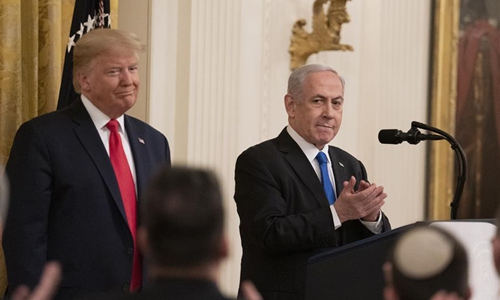HOME >> WORLD
Trump unveils controversial Middle East peace plan
Source:Xinhua Published: 2020/1/29 15:03:18

US President Donald Trump (L) and Israeli Prime Minister Benjamin Netanyahu attend a joint press conference in the White House in Washington D.C., the United States, on Jan. 28, 2020. U.S. President Donald Trump on Tuesday revealed the long-awaited political aspect of his controversial Middle East peace plan, calling for a two-state solution while recognizing Jerusalem as Israel's "undivided capital." Photo: Xinhua
US President Donald Trump on Tuesday revealed the long-awaited political aspect of his controversial Middle East peace plan, calling for a two-state solution while recognizing Jerusalem as Israel's "undivided capital."
Trump outlined the 80-page plan at the White House along with visiting Israeli Prime Minister Benjamin Netanyahu, saying that it proposes a "realistic" two-state solution.
Calling it a "win-win opportunity" for both sides, Trump said the new plan recognizes Jerusalem as Israel's "undivided capital," while claiming that the Palestinians' capital will include areas of East Jerusalem.
Meanwhile, Trump cautioned that "the conditions for statehood" should be met before the creation of "a contiguous territory within the future Palestinian State," which included stopping "the malign activities of Hamas," ending the incitement of hatred against Israel, among others.
"We will never ask Israel to compromise its security," Trump said.
Speaking at the White House, Netanyahu thanked Trump for recognizing Israel's sovereignty over areas in Judea and Samaria, which is the Israeli term for the West Bank, in the plan, describing Tuesday as "a historic day" and praising Trump as "the greatest friend that Israel has ever had in the White House."
The plan stipulates that "Israel will retain security control in the entire area west of the Jordan River ... giving Israel a permanent eastern border to defend ourselves," Netanyahu said.
The Jordan Valley, making up some 20 percent of the West Bank, were seized by Israel in the 1967 Middle East war and controlled ever since despite international criticism.
The veteran Israeli right-wing politician also applauded the plan which he claimed called for Hamas to be disarmed, Gaza to be demilitarized and regulates that the Palestinian refugee problem must be solved "outside the State of Israel."
In the plan, Trump also promised to double Palestinian-controlled territory and proposed a four-year freeze of Israeli development in the area expected to be part of a Palestinian state.
Trump said he had sent a letter to Palestinian President Mahmoud Abbas, saying that the Palestinians will have four years to study the deal and negotiate with Israel.
The Trump administration has postponed several times the publication of its "Deal of the Century" for peace between the Israelis and the Palestinians, a proposal that had been criticized repeatedly by the Palestinians who had little engagement in it. The economic portion of the plan was unveiled last June at a convention in Bahrain which was boycotted by the Palestinians.
The Palestinian Authority said earlier on Tuesday that the new US Middle East peace plan aims to establish an isolated Palestinian entity in the Gaza Strip.
Also on Tuesday, thousands of Palestinians demonstrated in Gaza against the plan.
Washington's role as an Israeli-Palestinian conflict mediator has been questioned following the Trump administration's pro-Israeli policies in the past three years including recognizing Jerusalem as Israel's capital and moving the US Embassy there, and slashing hundreds of millions of US dollars in humanitarian aid to the Palestinians.
Experts pointed out that the announcement of the plan came at a time when Trump needs a distraction from the impeachment proceedings and Netanyahu is struggling with corruption charges.
Posted in: MID-EAST